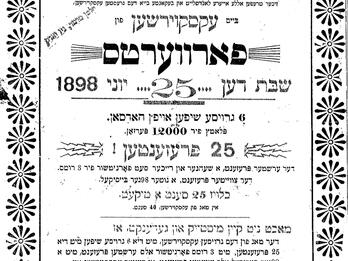Brivenshteler: A Letter to a Friend in Russia about America
Dear Friend,
You asked me in your last letter to write about America, what kind of country it is and what life is like here. I had to smile as I read your words. [ . . . ]
In order to describe America, I would have to live another couple of decades so that I’d have the time to finish explaining; it would take so much paper that I would not even know where to store all of it, not to mention that you won’t have enough space for it either.
To describe America!
This, my friend, is not some village or a small town. It’s a world with little worlds in it. The people who live here come from everywhere: from every country and every city and every nation.
Every single day wonderful things are invented here that you can’t even imagine. Here people travel on the ground and in the air, above buildings and below the street, and even under the seas and rivers. This is truly a world of miracles. If you want to describe everything you see, you don’t know where to begin, and no matter how well you will describe something important, it will not be good enough.
If we were to magically take someone from your shtetl and drop him in one of New York’s boiling streets, he would surely go crazy immediately. He would not be able to understand what’s going on around him.
He would be confronted with the following image:
Electric trains packed with men and women flying back and forth constantly. In the same streets you also have cars flying by, filled with elegant people, carriages, and trucks loaded with all kinds of goods; all this tumult is mixed with the noise of the electric trains flying by high up on rails built in the air. The sidewalks are packed with people to the extent that you can barely push your way through. To this unusual noise, add the loud voice of the young boys who sell newspapers screaming, “Extra!”
It may seem like I just described everything to you, but this barely scratches the surface. You have to see it with your own eyes; the pen is too weak to depict it.
What I can tell you without getting into much detail is that in my opinion America is a blessed land, the best and happiest country in the world.
I will not say that everything here is nice and good and everyone is fortunate. [ . . . ]
If only we would live to see our Jews in their own land, Palestine, as fortunate as they are here in America.
Do not laugh, my friend, about this wish. If you were here and if you could see the status of Jews in this world, you would understand that I love my people with all my heart and I could not find any blessing better than this one for my coreligionists.
Just take a look at the main commercial streets in New York. You would be astonished to see that the largest, finest businesses are in Jewish hands.
You would be beside yourself seeing that almost all of the Jews who fled Russia naked and barefoot live in decent circumstances here, a large percentage of them are rich, and a small percentage of them are millionaires.
Here in America Jews have demonstrated how talented and energetic they are.
Here we can see how far ahead Yankele could get if only he is granted full freedom.
The best students at every elementary school and university are Jews, the best doctors and professors (of medicine and mathematics) are Jews, and who are the best and most prominent lawyers? Jews, Jews, and Jews.
If I were to attempt to describe everything concerning us Jews in America I would have to go on writing for a couple of years and I still couldn’t get to the end.
Thus, I will end my letter now with the wish that we should merit to see our people in their own land as fortunate as they are here in America.
This blessing comes from the bottom of your true friend’s heart.
Isaac Dov Eisenstein
Translated by
.
Credits
Shomer (Nahum Meir Shaykevitch), “Tsu a fraynd in Rusland vegn Amerike” [Letter to a Friend in Russia about America], Shaykevitshes nayer brivenshteler (New York: Hebrew Publishing Company, 1925), pp. 167–72.
Published in: The Posen Library of Jewish Culture and Civilization, vol. 7.



